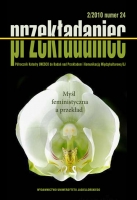„Tłumaczka Tylora i Morgana”. O Aleksandrze Bąkowskiej i jej działalności społecznej
"Translator of Tylor and Morgan" – Aleksandra Bąkowska and her Social Activity
Author(s): Agata ZawiszewskaSubject(s): Language and Literature Studies
Published by: Wydawnictwo Uniwersytetu Jagiellońskiego
Keywords: agrarian reform; anthropology; feminism; modernism; Lewis Henry˛Morgan; Paulina Kuczalska-Reinschmit; Aleksandra Bąkowska
Summary/Abstract: The article is about the friendship and social activity of two important female representatives of the Polish emancipation movement at the turn of the 19th century: Aleksandra Bąkowska, aristocrat and owner of the Gołotczyzna estate as well as translator of early American anthropological works, and Paulina Kuczalska- Reinschmit, an impoverished noblewoman, the leader of the suffragette movement in the Polish Kingdom. Both women were inspired by the ideas of Lewis Henry Morgan, the researcher of the Iroquois culture and the author of, among others, Ancient Society (1877), in which he described and compared different systems of kinship in pre- and non-Christian cultures. A. Bąkowska translated this book into Polish in 1887 which triggered the discussion among early Polish sociologists, anthropologists and cultural philosophers in which the most important was the issue of the historicity of the institution of a monogamous marriage and a patriarchal family. A. Bąkowska turned a part of the Gołotczyzna estate into a school for country girls based on the principles resembling the communist community of rights and obligations which community was described by L.H. Morgan based on the observation of Indian tribes. P. Kuczalska-Reinschmit, on the other hand, established the Polish Women Emancipation Association in Warsaw, whose seat – with a reading room, a lending library, a lecture hall – was also organized as a community, mainly for women. Both initiatives led to the dissemination of emancipation ideas in the Polish Kingdom before WWI and contributed to the principle of equality of rights for men and women being inscribed in the new Polish constitution of 1918.
Journal: Przekładaniec.
- Issue Year: 2011
- Issue No: 24
- Page Range: 50-89
- Page Count: 40
- Language: Polish

